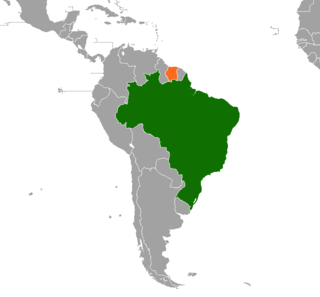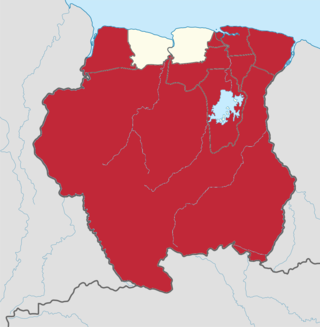Related Research Articles

The president of the Republic of Suriname is, in accordance with the Constitution of 1987, the head of state and head of government of Suriname, and commander-in-chief of the Suriname National Army (SNL). The president also appoints a cabinet.
The Jungle Commando was a guerrilla commando group in Suriname. It was founded by Ronnie Brunswijk in 1986 to ensure equal rights for Suriname's minority Maroon population. The group was formed after the Suriname troops committed mass murder against 35 people in Moiwana Village, near Moengo, after the Suriname national army failed to capture Ronnie Brunswijk. The Commando fought against Dési Bouterse and the Surinamese army in the Suriname Guerrilla War.

Pokigron is a town in Suriname located on the Upper Suriname River near the Brokopondo Reservoir. It is located in the Boven Suriname municipality (resort) in the Sipaliwini District. It has a population of approximately 400 people in 2018. Pokigron is located at the end of a paved road via Brownsweg to the Afobakaweg. Pokigron is often referred to as Atjoni which is the nearby quay, and literally the end of the road. Villages to the South of Pokigron have to be accessed by boat. The village is home to Maroons of the Saramaka tribe.

Paul Slamet Somohardjo is a Surinamese politician of Javanese descent. Somohardjo has been called Paul Salam Somohardjo since childhood. Somohardjo also owns a radio and television station.
Ramsewak Shankar is a Surinamese politician who was the 4th President of Suriname, serving from 1988 to 1990. His government was overthrown by Dési Bouterse leading a bloodless military coup. Shankar had previously served as Agriculture & Fisheries Minister from 1969 to 1971.
Wilfred Hawker was a sergeant-major in the Surinamese military who was involved in two unsuccessful coups d'état in the early 1980s. Hawker was executed by the ruling military government for his role in the plots. He was the last person to be legally executed by Suriname.

The Surinamese Interior War was a civil war waged in the Sipaliwini District of Suriname between 1986 and 1992. It was fought by the Tucayana Amazonas led by Thomas Sabajo and the Jungle Commando led by Ronnie Brunswijk, whose members originated from the Maroon ethnic group, against the National Army led by then-army chief and de facto head of state Dési Bouterse.

Jules Sedney was a Surinamese politician, and Prime Minister of Suriname from 20 November 1969 to 24 December 1973. In 1980, he became governor of the Central Bank of Suriname, but had to flee the country in 1983 after a dispute with Dési Bouterse. Sedney returned to Suriname in 1989.

Stolkertsijver is a town in the Commewijne District of Suriname. It is situated on the East-West Link. At Stolkertsijver, a bridge spanning the Commewijne River was built in 1970s.

The 1980 Surinamese coup d'état, usually referred to as the Sergeants' Coup, was a military coup in Suriname which occurred on 25 February 1980, when a group of 16 sergeants of the Surinamese Armed Forces (SKM) led by Dési Bouterse overthrew the government of Prime Minister Henck Arron with a violent coup d'état. This marked the beginning of the military dictatorship that dominated the country from 1980 until 1991. The dictatorship featured the presence of an evening curfew, the lack of freedom of press, a ban on political parties, a restriction on the freedom of assembly, a high level of government corruption and the summary executions of political opponents.

Ronnie Brunswijk is a Surinamese politician, businessman, former rebel leader, footballer and convicted drug trafficker, who is serving as the current Vice President of Suriname.

Johannes Samuel Petrus "Johan" Kraag was a Surinamese politician who served as the President of Suriname from 29 December 1990, until 16 September 1991.

Hendrick Rudolf "Henk" Chin A Sen was a Surinamese politician who served as the President of Suriname from 15 August 1980 until 4 February 1982.

Brazil–Suriname relations are the bilateral relations between the Federative Republic of Brazil and the Republic of Suriname. Diplomatic relations were established on 3 March 1976. Brazil has an embassy in Paramaribo since the independence of Suriname on 25 November 1975. Suriname has an embassy in Brasília since 1976, and a consulate in Belém since 2012.
Roy Dennis Horb was a Surinamese military officer. He was one of the sergeants who committed a military coup in Suriname on 25 February 1980, and the right hand man of army leader Dési Bouterse.

The COVID-19 pandemic in Suriname was caused by Severe acute respiratory syndrome coronavirus 2. The virus was confirmed to have reached Suriname on 13 March 2020. The case was a person who travelled from the Netherlands the previous week. On 3 April 2020, one person died. On 3 May 2020, all nine cases had recovered. On 18 May, an eleventh case was identified.

Stoelmanseiland is an island, and a village in the Paramacca resort of the Sipaliwini District. It is located at the confluence of the Tapanahony River with the Lawa River which forms the Marowijne River, and is also the border with French Guiana.
Alfonsdorp is a village of indigenous Lokono people in the Albina resort of the Marowijne District of Suriname. The village is located on the East-West Link. The Wanekreek Nature Reserve is located near the village.

The Paramaribo Zoo is the only zoo in Suriname. The zoo opened in May 1972, and was an initiative of prime-minister Jopie Pengel. It is located adjacent to the Cultuurtuin in Rainville, Paramaribo.

Diplomatic relations between Cuba and Suriname were established on 23 March 1979. Suriname has an embassy in Havana since 2003. Cuba has an embassy in Paramaribo since 1981.
References
- 1 2 3 4 5 6 "Het vergeten verhaal van de Tucajana's". De Ware Tijd via Nickerie.net (in Dutch). Retrieved 18 June 2020.
- 1 2 "Sranan. Cultuur in Suriname". Digital Library for Dutch Literature (in Dutch). 1992. Retrieved 18 June 2020.
- ↑ Boven 2006, p. 197.
- ↑ Boven 2006, p. 199.
- 1 2 3 4 "Desi Bouterse". Amnesty International (in Dutch). Retrieved 18 June 2020.
- ↑ "Bauxietstad Mungo door onbekende groep overvallen". Reformatorisch Dagblad via Digibron (in Dutch). 14 October 1989. Retrieved 18 June 2020.
- 1 2 "ANNUAL REPORT OF THE INTER-AMERICAN COMMISSION ON HUMAN RIGHTS 1989-1990". Inter-American Commission on Human Rights. 17 May 1990. Retrieved 18 June 2020.
- ↑ "Tucayana's breken met eigen leiders". Reformatorisch Dagblad via Digibron.nl (in Dutch). 1 February 1990. Retrieved 18 June 2020.
- ↑ "SURINAME 1992". Human Right Watch. Retrieved 18 June 2020.
- ↑ "Factcheck: sprak pater Toon de waarheid?". Waterkant (in Dutch). Retrieved 18 June 2020.
- ↑ Janssen 2011, p. 226.
- ↑ "25 Jaar geleden - 5 – 10 februari 1990". Dagblad De West. Retrieved 18 June 2020.
- ↑ "25 Jaar geleden - 12 – 17 februari 1990". Dagblad De West (in Dutch). Retrieved 18 June 2020.
- ↑ "'Bouterse moet zijn leugens intrekken'". De Groene Amsterdammer (in Dutch). Retrieved 18 June 2020.
- 1 2 3 "Executie Surinaamse Inheemsen 'niet vergeten'". Waterkant (in Dutch). Retrieved 18 June 2020.
- ↑ Boven 2006, p. 206.
- ↑ Boven 2006, p. 207.
- ↑ Boven 2006, p. 210.